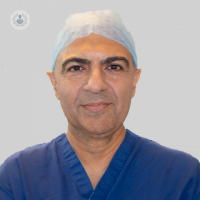cataract surgery major minor
Escrito por:Cataract surgery is continually evolving and is often seen by many as one of the most successful treatments in all of medicine. With the introduction of technology, this surgery is no longer just a simple treatment of cataracts, rather a refractive procedure able to significantly improve the lives of many. Leading consultant ophthalmologist, Mr Sundeep Kheterpal, explains more about this procedure and how it is performed.

How has cataract surgery evolved?
The process is no longer one of simple lens replacement but involves laser scans and computerised mapping to obtain the best possible pre-operative measurements to enable the very latest lens implants to be used. The evolution in the surgery now gives patients more choice in how they want to achieve their visual needs. Combining this process with correction of other visual errors such as astigmatism means getting better vision with less dependence on glasses. It also gives the opportunity for some people to have multifocal lens implants to lessen dependence on glasses after surgery.
Is cataract surgery easy to perform?
Yes and no! The perception has arisen that cataract surgery is a minor procedure very easy and quick to perform. Whilst it is true that it is now a quicker more straightforward procedure with quicker recovery and less complications than in years past, to get to that stage requires extensive surgical experience, expertise and advanced technology.
To incorporate advances with newer lens technology requires expertise in the assessment of vision correction, eye prescriptions, visual needs, higher levels of visual perception and abnormalities and the ability to deal with higher expectations from outcomes and to be able to adjust and deal with any adjustments that may be required.
Who should do my cataract surgery?
As the most common surgical procedure performed in the UK, there are many excellent surgeons to choose from and complication rates everywhere are generally low. Insurance companies these days try to direct patients to the lowest cost provider under the pretence of assuring quality. I advise you to ask the following questions before choosing your surgeon:
- How many procedures have you performed?
- Does the surgeon have experience with different types of lens implants?
- Does the surgeon have experience in vision correction surgery and laser vision correction so that they can assess and advise better in vision correction needs?
How much experience do you have and how many procedures have you performed?
Over my professional career, I have done thousands of cataract operations and have been undertaking cataract surgery for 26 years. I have used many different types of lens over the years including single focus, toric, bifocal, trifocal and extended depth of focus and put in my first multifocal lens in 1998. I have routinely undertaken laser vision correction since 2002 so I have a lot of experience in advising patients who desire specific vision correction as well as cataract surgery.
Having experience and the ability to do laser vision correction means that this option is also available to those who may need it in addition to cataract surgery.
If you are looking for advice on cataract surgery, visit Mr Sundeep Kheterpal’s profile to book a consultation. You can check his availability here.


